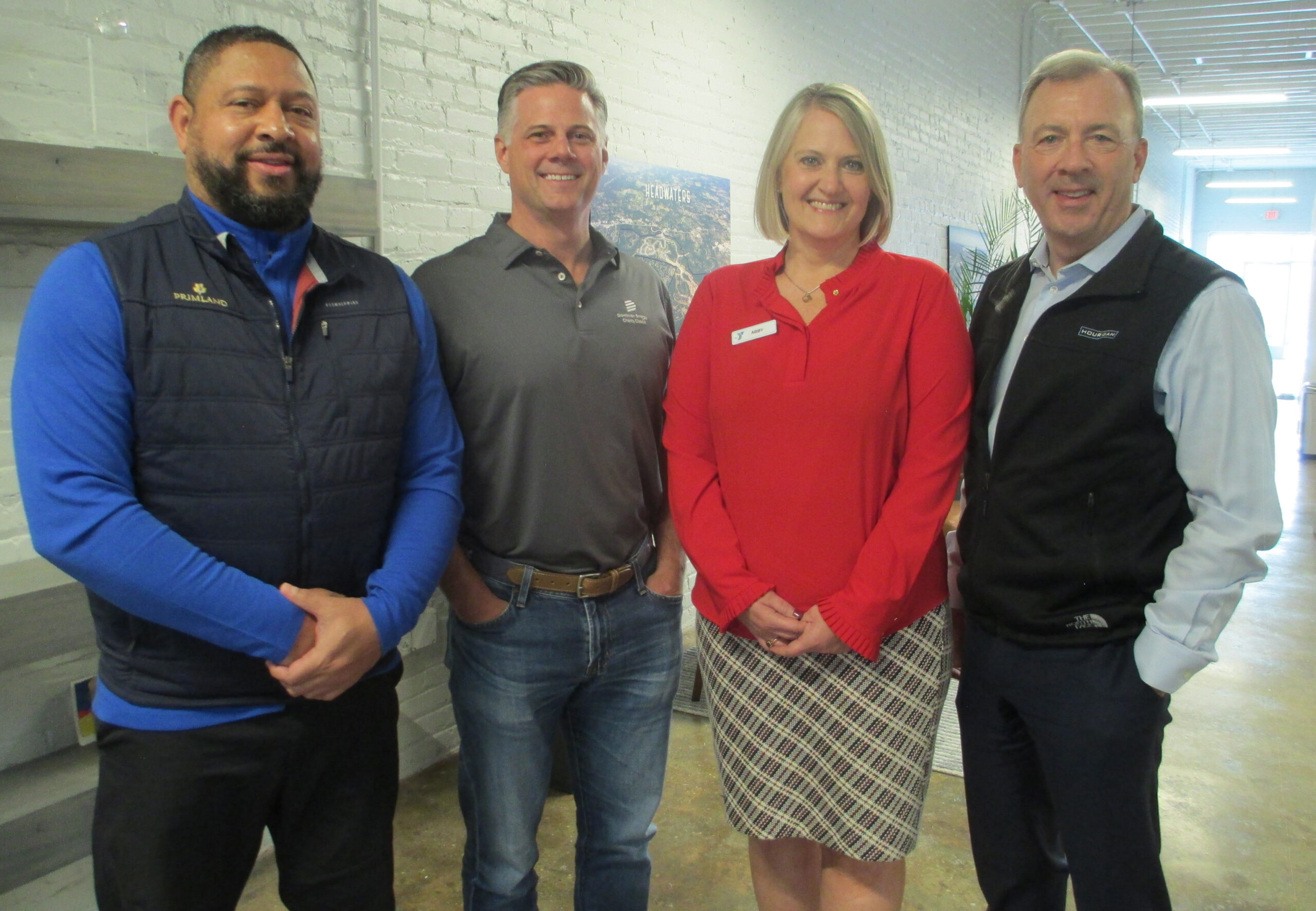
Vision300 Partners team members include, from left, Sam Young with Astyra Corp., Casey Tischer with Freehold Capital, Abby Rogers with YMCA Greater Richmond, and Mark Hourigan with construction firm Hourigan. (Jonathan Spiers photo)
Richmond’s recent update to its long-range master plan not only laid the groundwork for the latest push to redevelop the now-named Diamond District, it also spawned one of the development teams vying to pull it off.
The largely Richmond-based team called Vision300 Partners is so named due to some of its members’ involvements in the Richmond 300 master plan update, a yearslong effort that led to the Diamond District’s rezoning and in turn the city’s solicitation for interest in the stadium-anchored mixed-use project.
Mark Hourigan, whose namesake local construction and development firm is among the team’s primary players, said they decided over the course of the Richmond 300 process to see the plan’s recommendations for the district play out.
“We were just trying to help Richmond become a better place. But as we looked around the table and saw the other community leaders and proven business leaders that were together, this team came together and said we have a way we can move this forward,” Hourigan said. “It was kind of organic.”
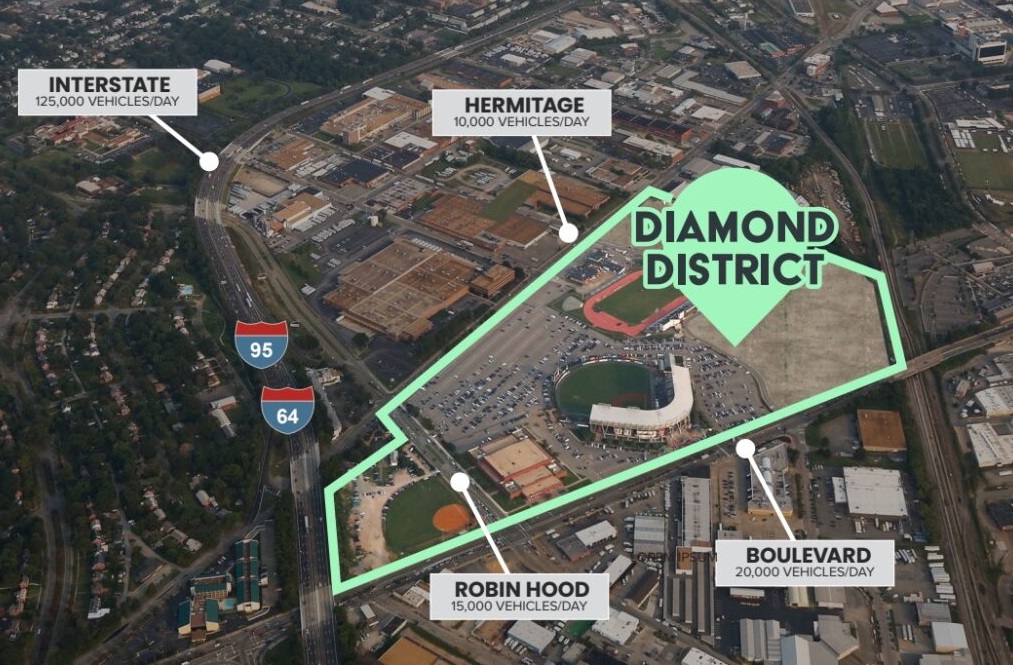
The 60-plus acres of the Diamond District are bordered by Arthur Ashe Boulevard, Hermitage Road, the interstate and the railroad tracks. (BizSense file)
Joining Hourigan on the team is Freehold Capital Management, a Boston-based firm with an office in Scott’s Addition that’s serving as lead developer for the team, along with an assembly of notable players in Richmond’s development scene including housing nonprofit Better Housing Coalition, hospitality giant Shamin Hotels and developer Spy Rock Real Estate Group.
Other local team members include YMCA of Greater Richmond, Metropolitan Business League, staffing and consulting firm Astyra Corp., construction firm Canterbury Enterprises, and youth athletics group Sports United Ltd.
Previously unannounced members include local engineering firm Timmons Group and architecture firm HKS, headquartered in Dallas but with an office in Richmond.
Rounding out the team are Toronto-based investment firm Brookfield Asset Management, Atlanta-based developer Greenstone Properties, Dallas-based developer KDC, and Florida-based Kodjoe Family Foundation.
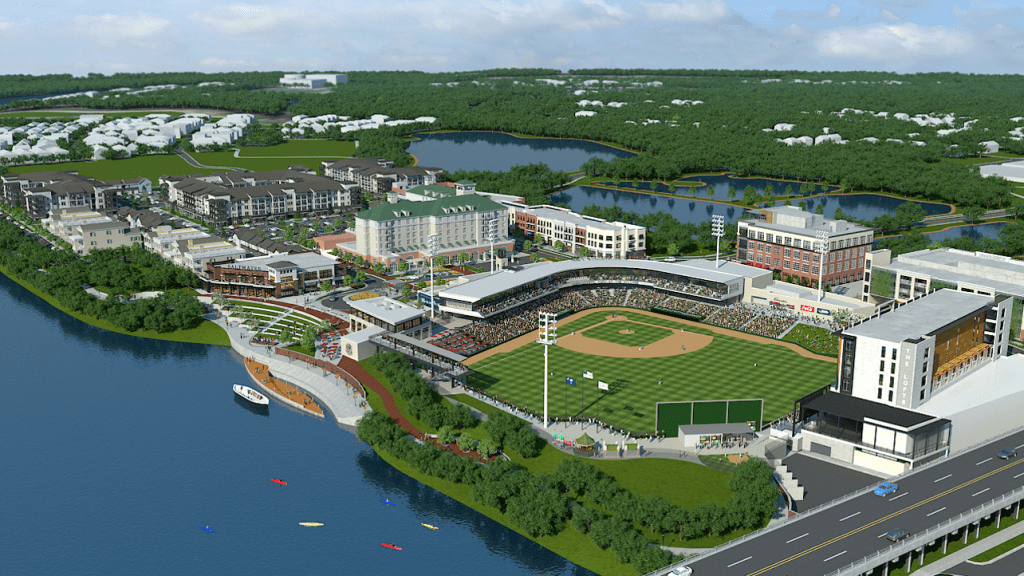
Greenstone’s work includes SRP Park stadium and the adjacent Riverside Village multi-use development in North Augusta, South Carolina. (Photos courtesy of Hourigan)
Greenstone, which has developed and operates several baseball stadiums, would lead development of the new stadium to replace The Diamond, with HKS handling design. The firms previously collaborated on Riverside Village, a 35-acre multiuse development in North Augusta, South Carolina anchored by SRP Park, home to the minor-league Augusta GreenJackets ballclub.
Greenstone also developed the Parkview Field stadium and an adjacent mixed-use building in Fort Wayne, Indiana. HKS’s stadium design credits include Regions Field in Birmingham, Alabama, home to the Birmingham Barons Double-A club.
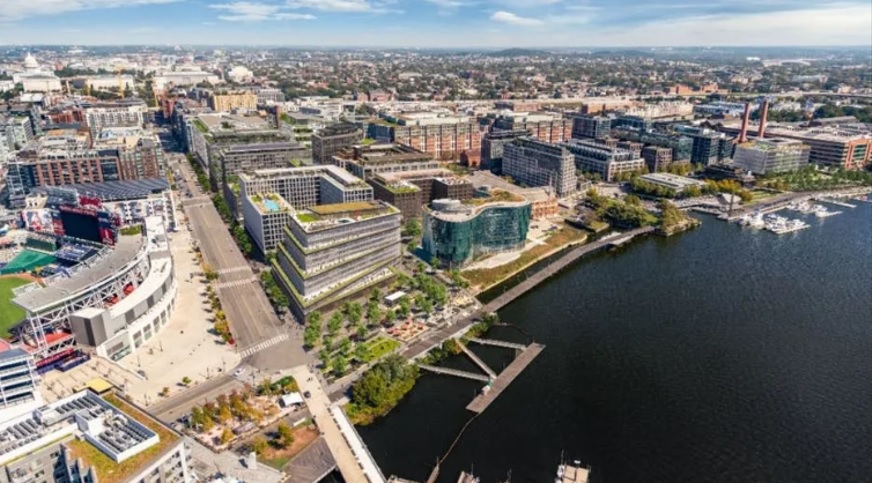
Team member Brookfield’s developments include The Yards mixed-use development next to the Nationals Park stadium in D.C.
Brookfield Asset Management is tied to Brookfield Properties, which co-owns Short Pump Town Center. Brookfield’s developments include The Yards, a 42-acre mixed-use complex next to the Nationals Park stadium on the D.C. waterfront.
Freehold develops so-called master-planned communities and is led locally by Casey Tischer, who moved from Boston to Richmond six years ago for personal reasons and established an office in Scott’s Addition. While the company has yet to do work in Richmond, the office’s proximity to The Diamond reflects its priority, Tischer said.
“We don’t have any specific real estate here, but we’ve been working on this for a very long time,” Tischer said, adding that the team has spent several years on the project already.
“Projects like this take a tremendous amount of time and coordination. It’s not just real estate; it’s putting a lot of different, likeminded people together, and that’s really what the focus here has been,” he said. “We all want to win this, and we want it to happen. We’ve seen unsuccessful opportunities pass us by, and we want this to work, so we’ve thrown together a lot of resources to try and execute this.”
Among those likeminded people are Sam Young, president of Astyra Corp., and Abby Rogers, CEO of YMCA Greater Richmond.
A Church Hill resident who’s lived in the Richmond area 54 years, Young brings not only his business leadership experience to the table but also perspective on housing needs from his years on boards for the Richmond Redevelopment & Housing Authority, LISC Virginia, ChamberRVA and Metropolitan Business League.
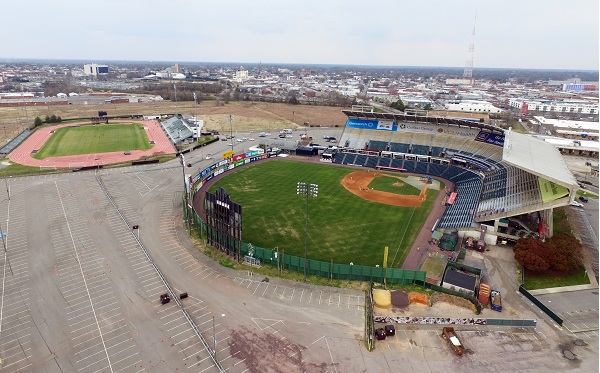
The area that makes up the Diamond District includes the namesake baseball stadium and nearby Sports Backers Stadium. (BizSense file)
“The affordable housing piece is something that I did for nine years, and I’m still engaged,” Young said. “Just from a community engagement standpoint and leadership standpoint, I’ve been around a long time. When you talk about community benefits, what’s good for our residents and businesses, people of color, women, I’ve been immersed in that for over 20 years.”
Rogers, who oversees the Y’s 17 branches including three in the city, said the Diamond District project presents a unique opportunity for the Y and other stakeholders to be part of the creation of a new neighborhood.
“We’re about building communities. Our cause is to strengthen the foundations of community, and what we’re doing (with the Diamond District) is building a new community,” Rogers said. “For us to be part of a process that is rethinking how we build the community for the future, how we build a more equitable community and do it from the ground up, is a really exciting opportunity.”
“We’re building a neighborhood. We’re building a ZIP code,” Tischer added. “Those are really important things to be thinking about. When we do this in our business, you’re not just impacting roads and physical things; you’re impacting people and kids going to school, what do schools look like and services, how do people live with each other.”
Vision300 is one of six teams that remain in contention for the 67-acre mixed-use redevelopment that’s to include a replacement of the 37-year-old Diamond baseball stadium. After making the latest cut in the process, the teams were asked to provide additional information about themselves and their approach to the project — details that are due to the city April 25.
An evaluation panel will then review the information and select a shortlist of finalists, who will be invited to submit proposals by early June. A final selection is targeted later that month.
The city is looking for one or more teams to collaborate with on redeveloping the site that’s been floated for redevelopment for over a decade. Driving this latest effort, in addition to Richmond 300, is a deadline set by Major League Baseball for all pro baseball venues to meet new facility standards by the start of the 2025 season. The Richmond Flying Squirrels has been promised a new ballpark since the Double-A club’s arrival in 2010.
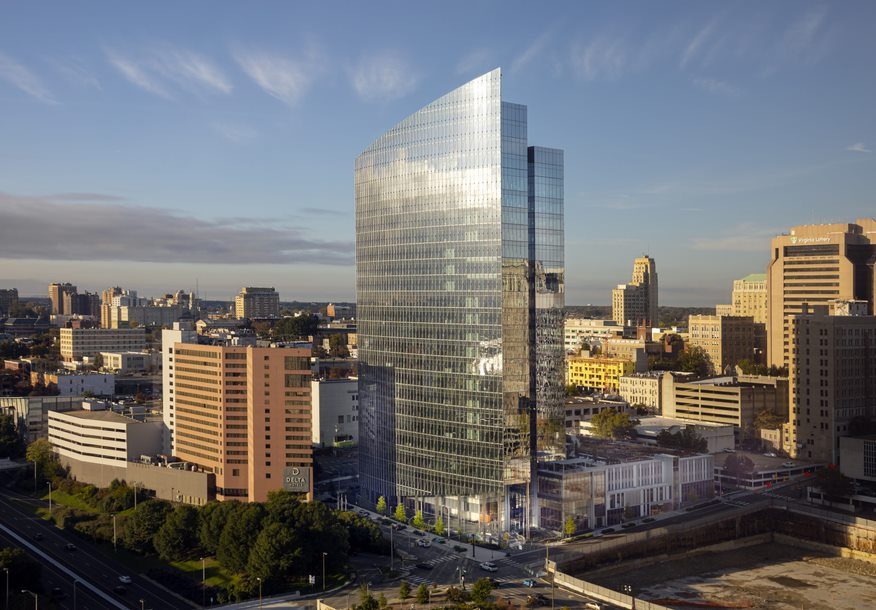
Hourigan’s local work includes Dominion Energy’s 600 Canal Place tower. (Photo courtesy of Hourigan)
Hourigan, whose company’s local credits include Dominion Energy’s 600 Canal Place tower and VCU Health’s Adult Outpatient Pavilion building, said their team brings a level of local knowledge and experience that its competitors can’t match.
“We understand Richmond. We’re here, we have been here. So, we understand from the ground up what the community needs and I think our team reflects that,” Hourigan said.
“This team has thought about what we will present, and how does that benefit the community and how does it work as a real estate deal. It’s got to be both. The conversations around the table have been rich and robust in terms of how we accomplish that,” he said.
While they declined to discuss their vision in detail or the teams they’re competing with to win the project, Young said they’ve been happy to see the level of interest in the Diamond District both locally and nationally.
“As a Richmonder, I love the fact that there’s competition because it’s very healthy,” he said. “It’s a win for the city.”
Added Rogers: “Who would’ve thought we could have gotten that many really great ideas and proposals coming into the city to do this project. That’s exciting for Richmond.”
Even so, the group stands by their bid among a field of other teams with notable national names. While Vision300’s makeup is primarily local, Tischer said they’ve struck a balance with national teammates as well.
“We’re able to blend local horsepower and execution, which has not been small here, but also national horsepower and execution,” Tischer said. “We are national in scope, we are extraordinarily well-capitalized, and we also are very local in terms of how to ensure that we can benefit the community.”
Of their proposal if picked for the shortlist, Hourigan added: “I would say it’s going to be a bold vision that serves the community at a very high level but still works as a real estate development deal. That’s part of the strength we bring, is the ability to see what that can be — not what’s worked elsewhere.”
The other five teams that remain in contention are:
Diamond District Gateway Partners, consisting of local real estate investment firm Capital Square, D.C.-based developers Dantes Partners and Hoffman & Associates, Maryland-based real estate firm The Velocity Cos., architecture firms Baskervill and Pendulum, engineering firms VHB and Froehling & Robertson, and general contractors Clancy & Theys and Barton Malow.
Richmond Community Development Partners, consisting of Houston-based Machete Group, developers JMA Ventures and Sterling Project Development, construction firm Gilbane, hotel management and advisory firm Retro Hospitality, architecture firm Hanbury, engineering firm VHB and planning nonprofit Storefront for Community Design.
MAG Partners, a New York City-based developer working with Seattle-based developer MacFarlane Partners, D.C.-based developer Jair Lynch Real Estate Partners, real estate investment firm MSquared, architecture firms AtelierTek and Woods Bagot, engineering firms Kimley-Horn and Thornton Tomasetti, sports venue developer CAA Icon, and placemaking and workforce firm C Space.
RVA Diamond Partners, team members unknown.
Weller Development Co. and LMXD, consisting of Weller, a Baltimore-based developer, and LMXD, affiliated with New York-based L+M Development Partners.

Vision300 Partners team members include, from left, Sam Young with Astyra Corp., Casey Tischer with Freehold Capital, Abby Rogers with YMCA Greater Richmond, and Mark Hourigan with construction firm Hourigan. (Jonathan Spiers photo)
Richmond’s recent update to its long-range master plan not only laid the groundwork for the latest push to redevelop the now-named Diamond District, it also spawned one of the development teams vying to pull it off.
The largely Richmond-based team called Vision300 Partners is so named due to some of its members’ involvements in the Richmond 300 master plan update, a yearslong effort that led to the Diamond District’s rezoning and in turn the city’s solicitation for interest in the stadium-anchored mixed-use project.
Mark Hourigan, whose namesake local construction and development firm is among the team’s primary players, said they decided over the course of the Richmond 300 process to see the plan’s recommendations for the district play out.
“We were just trying to help Richmond become a better place. But as we looked around the table and saw the other community leaders and proven business leaders that were together, this team came together and said we have a way we can move this forward,” Hourigan said. “It was kind of organic.”

The 60-plus acres of the Diamond District are bordered by Arthur Ashe Boulevard, Hermitage Road, the interstate and the railroad tracks. (BizSense file)
Joining Hourigan on the team is Freehold Capital Management, a Boston-based firm with an office in Scott’s Addition that’s serving as lead developer for the team, along with an assembly of notable players in Richmond’s development scene including housing nonprofit Better Housing Coalition, hospitality giant Shamin Hotels and developer Spy Rock Real Estate Group.
Other local team members include YMCA of Greater Richmond, Metropolitan Business League, staffing and consulting firm Astyra Corp., construction firm Canterbury Enterprises, and youth athletics group Sports United Ltd.
Previously unannounced members include local engineering firm Timmons Group and architecture firm HKS, headquartered in Dallas but with an office in Richmond.
Rounding out the team are Toronto-based investment firm Brookfield Asset Management, Atlanta-based developer Greenstone Properties, Dallas-based developer KDC, and Florida-based Kodjoe Family Foundation.

Greenstone’s work includes SRP Park stadium and the adjacent Riverside Village multi-use development in North Augusta, South Carolina. (Photos courtesy of Hourigan)
Greenstone, which has developed and operates several baseball stadiums, would lead development of the new stadium to replace The Diamond, with HKS handling design. The firms previously collaborated on Riverside Village, a 35-acre multiuse development in North Augusta, South Carolina anchored by SRP Park, home to the minor-league Augusta GreenJackets ballclub.
Greenstone also developed the Parkview Field stadium and an adjacent mixed-use building in Fort Wayne, Indiana. HKS’s stadium design credits include Regions Field in Birmingham, Alabama, home to the Birmingham Barons Double-A club.

Team member Brookfield’s developments include The Yards mixed-use development next to the Nationals Park stadium in D.C.
Brookfield Asset Management is tied to Brookfield Properties, which co-owns Short Pump Town Center. Brookfield’s developments include The Yards, a 42-acre mixed-use complex next to the Nationals Park stadium on the D.C. waterfront.
Freehold develops so-called master-planned communities and is led locally by Casey Tischer, who moved from Boston to Richmond six years ago for personal reasons and established an office in Scott’s Addition. While the company has yet to do work in Richmond, the office’s proximity to The Diamond reflects its priority, Tischer said.
“We don’t have any specific real estate here, but we’ve been working on this for a very long time,” Tischer said, adding that the team has spent several years on the project already.
“Projects like this take a tremendous amount of time and coordination. It’s not just real estate; it’s putting a lot of different, likeminded people together, and that’s really what the focus here has been,” he said. “We all want to win this, and we want it to happen. We’ve seen unsuccessful opportunities pass us by, and we want this to work, so we’ve thrown together a lot of resources to try and execute this.”
Among those likeminded people are Sam Young, president of Astyra Corp., and Abby Rogers, CEO of YMCA Greater Richmond.
A Church Hill resident who’s lived in the Richmond area 54 years, Young brings not only his business leadership experience to the table but also perspective on housing needs from his years on boards for the Richmond Redevelopment & Housing Authority, LISC Virginia, ChamberRVA and Metropolitan Business League.

The area that makes up the Diamond District includes the namesake baseball stadium and nearby Sports Backers Stadium. (BizSense file)
“The affordable housing piece is something that I did for nine years, and I’m still engaged,” Young said. “Just from a community engagement standpoint and leadership standpoint, I’ve been around a long time. When you talk about community benefits, what’s good for our residents and businesses, people of color, women, I’ve been immersed in that for over 20 years.”
Rogers, who oversees the Y’s 17 branches including three in the city, said the Diamond District project presents a unique opportunity for the Y and other stakeholders to be part of the creation of a new neighborhood.
“We’re about building communities. Our cause is to strengthen the foundations of community, and what we’re doing (with the Diamond District) is building a new community,” Rogers said. “For us to be part of a process that is rethinking how we build the community for the future, how we build a more equitable community and do it from the ground up, is a really exciting opportunity.”
“We’re building a neighborhood. We’re building a ZIP code,” Tischer added. “Those are really important things to be thinking about. When we do this in our business, you’re not just impacting roads and physical things; you’re impacting people and kids going to school, what do schools look like and services, how do people live with each other.”
Vision300 is one of six teams that remain in contention for the 67-acre mixed-use redevelopment that’s to include a replacement of the 37-year-old Diamond baseball stadium. After making the latest cut in the process, the teams were asked to provide additional information about themselves and their approach to the project — details that are due to the city April 25.
An evaluation panel will then review the information and select a shortlist of finalists, who will be invited to submit proposals by early June. A final selection is targeted later that month.
The city is looking for one or more teams to collaborate with on redeveloping the site that’s been floated for redevelopment for over a decade. Driving this latest effort, in addition to Richmond 300, is a deadline set by Major League Baseball for all pro baseball venues to meet new facility standards by the start of the 2025 season. The Richmond Flying Squirrels has been promised a new ballpark since the Double-A club’s arrival in 2010.

Hourigan’s local work includes Dominion Energy’s 600 Canal Place tower. (Photo courtesy of Hourigan)
Hourigan, whose company’s local credits include Dominion Energy’s 600 Canal Place tower and VCU Health’s Adult Outpatient Pavilion building, said their team brings a level of local knowledge and experience that its competitors can’t match.
“We understand Richmond. We’re here, we have been here. So, we understand from the ground up what the community needs and I think our team reflects that,” Hourigan said.
“This team has thought about what we will present, and how does that benefit the community and how does it work as a real estate deal. It’s got to be both. The conversations around the table have been rich and robust in terms of how we accomplish that,” he said.
While they declined to discuss their vision in detail or the teams they’re competing with to win the project, Young said they’ve been happy to see the level of interest in the Diamond District both locally and nationally.
“As a Richmonder, I love the fact that there’s competition because it’s very healthy,” he said. “It’s a win for the city.”
Added Rogers: “Who would’ve thought we could have gotten that many really great ideas and proposals coming into the city to do this project. That’s exciting for Richmond.”
Even so, the group stands by their bid among a field of other teams with notable national names. While Vision300’s makeup is primarily local, Tischer said they’ve struck a balance with national teammates as well.
“We’re able to blend local horsepower and execution, which has not been small here, but also national horsepower and execution,” Tischer said. “We are national in scope, we are extraordinarily well-capitalized, and we also are very local in terms of how to ensure that we can benefit the community.”
Of their proposal if picked for the shortlist, Hourigan added: “I would say it’s going to be a bold vision that serves the community at a very high level but still works as a real estate development deal. That’s part of the strength we bring, is the ability to see what that can be — not what’s worked elsewhere.”
The other five teams that remain in contention are:
Diamond District Gateway Partners, consisting of local real estate investment firm Capital Square, D.C.-based developers Dantes Partners and Hoffman & Associates, Maryland-based real estate firm The Velocity Cos., architecture firms Baskervill and Pendulum, engineering firms VHB and Froehling & Robertson, and general contractors Clancy & Theys and Barton Malow.
Richmond Community Development Partners, consisting of Houston-based Machete Group, developers JMA Ventures and Sterling Project Development, construction firm Gilbane, hotel management and advisory firm Retro Hospitality, architecture firm Hanbury, engineering firm VHB and planning nonprofit Storefront for Community Design.
MAG Partners, a New York City-based developer working with Seattle-based developer MacFarlane Partners, D.C.-based developer Jair Lynch Real Estate Partners, real estate investment firm MSquared, architecture firms AtelierTek and Woods Bagot, engineering firms Kimley-Horn and Thornton Tomasetti, sports venue developer CAA Icon, and placemaking and workforce firm C Space.
RVA Diamond Partners, team members unknown.
Weller Development Co. and LMXD, consisting of Weller, a Baltimore-based developer, and LMXD, affiliated with New York-based L+M Development Partners.



Another great team to contend for the prize! We’re so fortunate that this process is so organized and competitive, unlike the fiascos we saw during the last 15 years. Perhaps our city government has learned its lesson? Or, has Richmond just turned the corner to become a big-time market, drawing interest nationally? Is it both?
Or, they guy who tried to buy his way into running roughshod over people passed away, and we have a power vacuum?
It’s going to be tough which team to pick. Is this a city council decision?
As far as the city, past experience has told me to not get excited until permits are pulled. But, I agree that the process appears a bit smoother thus far.
Good question and perhaps Maritzka could answer it? Is this a selection by the Mayor or the Council? Does one entity choose and the other approves? I’m concerned if this gets bogged down in Council debate over each of their favorite.
Honestly, after reading this, I was completely underwhelmed compared to the other featured developers in this series. I like the out-of-town developers who have some local representation more than the all-local developers. I’m just afraid that Hourigan will just continue to build the same old stuff that’s been built here in the city (they are a great developer, so not dissing them). We just need something more, something visionary and I’m not sure locals that have a myopic view of development in this area are going to make this project stand out as THE premier place to be in the… Read more »
They are not all local and Hourigan develops outside of Richmond , Virginia. The out-of-town developers do not understand the complexity of how this city operates. Stop working against your own community.